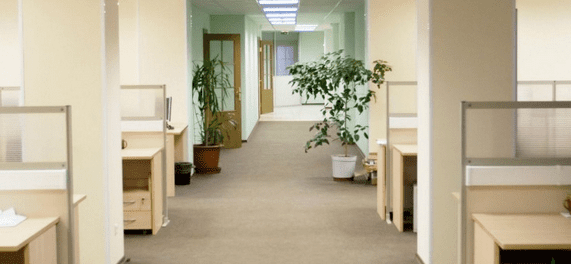We’ve all seen the meme that says “A Clean Desk is the Sign of a Dirty Mind.” While that’s certainly good for a laugh, the truth is actually just the opposite. A clean office environment triggers a wide variety of desirable attitudes and behaviors from employees and customers alike; a dirty office on the other hand wreaks all kinds of psychological havoc.
The English computer monitor manufacturing company NEC-Mitsubishi conducted research that proved a dirty or messy office environment significantly affects employees’ mental health and lowers their productivity. Levels of frustration and anxiety increased almost directly in correlation with the amount dirt and clutter in the workplace. The researchers even gave this fascinating phenomenon a name: Irritable Desk Syndrome.
Lest we think that the NEC study was an anomaly, there is much more evidence that suggests a dirty office exerts a negative influence on the workplace mindset. American Demographics Society determined that American workers waste 9 million hours every day rooting through office mess, searing for documents and other things, 25% of which are never found. The resulting psychological frustration causes employees to seek out distractions and disengagement (can you say Angry Birds?)
If that’s not enough reason for cleaning up your office’s act, let’s look at how the potential customer views a dirty or cluttered office. A survey conducted by a leading U.S. human resource services consultant determined that over 80% of those business owners surveyed based their perceptions of a company’s professionalism and capability on office cleanliness and neatness.
Would you meet a potential customer wearing dirty clothes? Well, neither should your office.
Commercial janitorial companies usually recommend a weekly office-cleaning regimen, in addition to whatever daily cleaning tasks are necessary. The psychological benefits of offering employees and customers a dirt-free office environment are nothing to sneeze at.
Speaking of sneezing, a study conducted by the University of Arizona found that the typical American worker’s desk “harbors 400 times more bacteria than the average toilet seat.” (reference http://www.sealshield.com/White_Papers/cloroxstudy.pdf) Human perceptions of germs and contagion can profoundly influence our subconscious thought patterns, which ultimate affect our behavior. When employees know their surroundings are clean and sanitary, their perceptions of themselves and others actually improve. So do their desirable work attitudes.
One study (http://www.sciencedirect.com/science/article/pii/S0022103110000880) actually proved that a feeling of cleanliness improves an individual’s moral and ethical thoughts and behaviors!
Business owners and managers are quickly figuring out that having a clean office is more than a superficial luxury… it is actually a way to increase employee engagement, productivity, and – ultimately – the bottom line.



